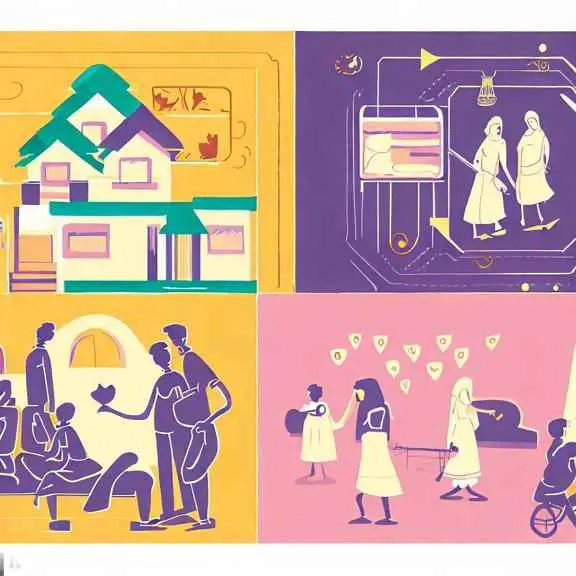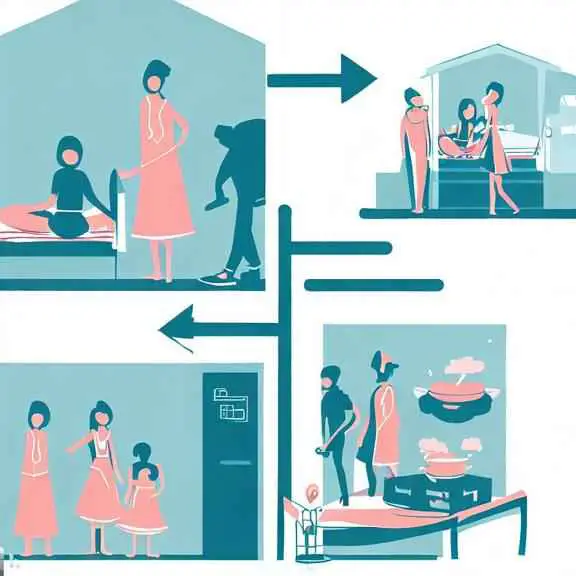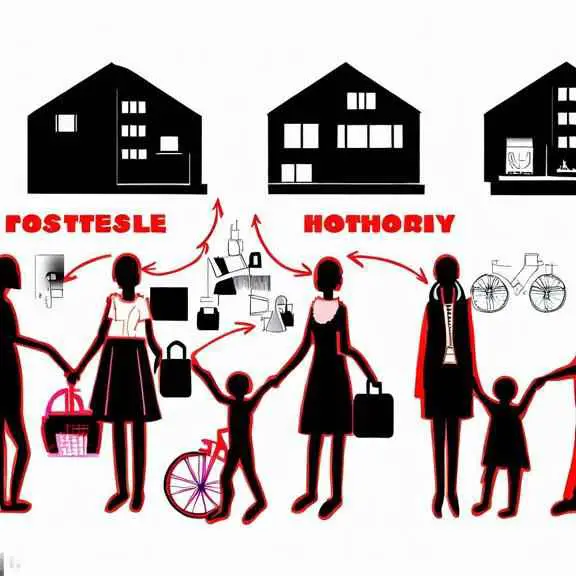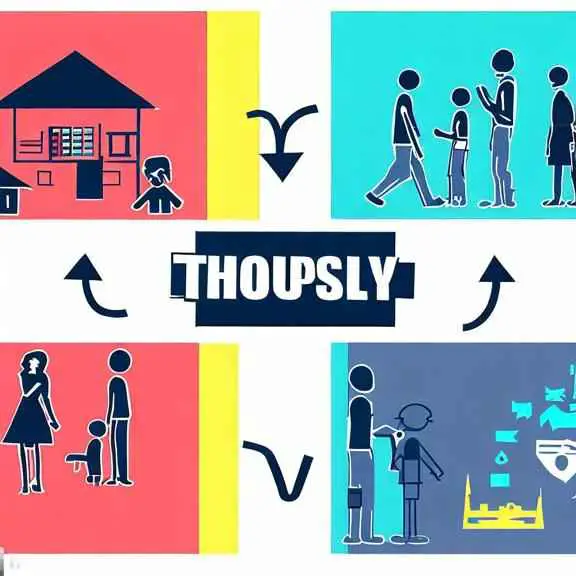Paragraph on
Family
for all Class, Words
by Personal Relationships on
Family is an essential aspect of human life, and it plays a critical role in shaping one’s personality and life experiences. It comprises a…, please continue reading.

Table of Content
Ad
The Paragraph on Family
Ad
Family is an essential aspect of human life, and it plays a critical role in shaping one’s personality and life experiences. It comprises a group of people related by blood or marriage. Family members provide love, support, protection, and companionship to one another, creating a strong sense of belongingness and security. Moreover, family members learn from each other and share their knowledge, experiences, and traditions. Childhood memories, family traditions, and strong emotional connections are all intertwined in a family, making it an essential and valuable part of our lives.
Children grow up in families, learning about the world from their parents, grandparents, and siblings. They learn from their families how to communicate effectively, resolve conflicts, and develop emotional intelligence. The family also provides a sense of identity and teaches children about their culture and values.
Family is not limited to immediate relatives; extended family members such as aunts, uncles, and cousins play an essential role as well. They provide a broader family network and offer more opportunities for social interaction and support.
Despite the importance of family, it can be challenging to navigate family relationships. Disagreements, conflicts, and misunderstandings arise in any family, but it is essential to work through them to maintain healthy relationships. Open communication, mutual respect, and understanding are crucial in handling such challenges.
In conclusion, family is an integral part of life, impacting the lives of individuals in various ways. It provides a source of love, support, protection, and companionship that helps individuals develop and grow. Family members learn from each other, share their experiences, and form lasting memories that create a sense of belongingness and security.

Questions about Family
Ad
Questions and Answers:
- What is a family?
Answer: A family is a group of people related by blood or marriage.
- What are the benefits of having a family?
Answer: The benefits of having a family include support, love, companionship, and a sense of belongingness.
- What role do families play in shaping the personality of children?
Answer: Families play an essential role in shaping the personality of children by providing them with communication skills, emotional intelligence, and a sense of culture and identity.
- Can extended family members play a role in family relationships?
Answer: Yes, extended family members such as aunts, uncles, and cousins can play roles in family relationships.
- What should individuals do to maintain healthy family relationships?
Answer: Open communication, mutual respect, and understanding are crucial in maintaining healthy family relationships.
- How do families learn from each other?
Answer: Families learn from each other by sharing experiences, traditions, and knowledge.
- Why is it essential to work through conflict in families?
Answer: It is essential to work through conflict in families because it allows for maintaining healthy relationships.
- How do family members create a sense of identity for individuals?
Answer: Family members create a sense of identity for individuals by teaching them about cultural traditions and values.
- How do childhood memories play a role in family relationships?
Answer: Childhood memories play a role in family relationships by creating a sense of bonding and nostalgia.
- What are some challenges that can arise in family relationships?
Answer: Some challenges that can arise in family relationships include disagreements, conflicts, and misunderstandings.

Vocabulary related to Family
Ad
Vocabulary words:
-
Companionship: The feeling of friendship or fellowship. Usage: The dog provided a sense of companionship to the old man.
-
Emotional intelligence: The ability to understand and manage emotions effectively. Usage: Teachers can help children develop emotional intelligence through regular interactions.
-
Belongingness: The feeling of being accepted and included in a group or society. Usage: The new employee felt a sense of belongingness after participating in the office outing.
-
Extended family: Family members outside the immediate family, such as aunt, uncles, and cousins. Usage: We had a family reunion where all the extended family members were present.
-
Traditions: A practice or behavior passed down from generation to generation. Usage: The family had a tradition of going for a walk after dinner.
-
Identity: The distinguishing characteristics that make an individual unique. Usage: His identity as an artist was evident in his paintings.
-
Mutual: Shared or felt by each of two or more parties. Usage: The project required mutual cooperation among the team members.
-
Nostalgia: A feeling of fondness or longing for the past. Usage: The old photographs stirred up nostalgia in the woman.
-
Relationship: The connection or association between two or more people or things. Usage: The therapist helps patients build a positive relationship with themselves.
-
Conflict: A serious disagreement or argument. Usage: It was hard to resolve the conflict between the two factions of the family.
-
Communication: The exchange of information or ideas between two or more parties. Usage: Good communication is essential for healthy relationships in families.
-
Network: A group or system of interconnected things or people. Usage: He built a vast professional network during his career.
-
Support: to give assistance to somebody when they need it. Usage: My family provided me with emotional support during a difficult time.
-
Respect: A feeling of admiration for somebody due to their qualities or achievements. Usage: She respected her mother for being a successful businesswoman.
-
Relatives: People in the family who are not members of the immediate family. Usage: The party was attended by all my relatives, including my cousins and uncles.
Companionship: The feeling of friendship or fellowship. Usage: The dog provided a sense of companionship to the old man.
Emotional intelligence: The ability to understand and manage emotions effectively. Usage: Teachers can help children develop emotional intelligence through regular interactions.
Belongingness: The feeling of being accepted and included in a group or society. Usage: The new employee felt a sense of belongingness after participating in the office outing.
Extended family: Family members outside the immediate family, such as aunt, uncles, and cousins. Usage: We had a family reunion where all the extended family members were present.
Traditions: A practice or behavior passed down from generation to generation. Usage: The family had a tradition of going for a walk after dinner.
Identity: The distinguishing characteristics that make an individual unique. Usage: His identity as an artist was evident in his paintings.
Mutual: Shared or felt by each of two or more parties. Usage: The project required mutual cooperation among the team members.
Nostalgia: A feeling of fondness or longing for the past. Usage: The old photographs stirred up nostalgia in the woman.
Relationship: The connection or association between two or more people or things. Usage: The therapist helps patients build a positive relationship with themselves.
Conflict: A serious disagreement or argument. Usage: It was hard to resolve the conflict between the two factions of the family.
Communication: The exchange of information or ideas between two or more parties. Usage: Good communication is essential for healthy relationships in families.
Network: A group or system of interconnected things or people. Usage: He built a vast professional network during his career.
Support: to give assistance to somebody when they need it. Usage: My family provided me with emotional support during a difficult time.
Respect: A feeling of admiration for somebody due to their qualities or achievements. Usage: She respected her mother for being a successful businesswoman.
Relatives: People in the family who are not members of the immediate family. Usage: The party was attended by all my relatives, including my cousins and uncles.

Structure of the sample "Family" paragraph
Ad
Cohesion and coherence:
The paragraph on Family has a clear structure with a well-framed introduction, body, and conclusion. It maintains coherence throughout by using linking words such as “moreover”, “despite”, “in conclusion” to connect ideas logically. The ideas are clearly presented, and each paragraph supports the thesis statement. The use of pronouns such as “their” and “they” creates cohesion between the ideas, reflecting a logical progression of thought.
